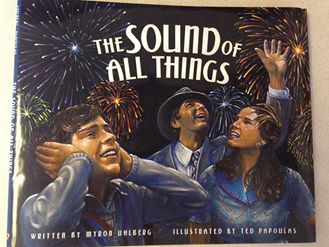I cannot believe it’s
been seven years since I saw my friend Myron Uhlberg. In 2009 after a
whirlwind of events over his memoir, Hands of My
Father, Uhlberg finally came home to Gallaudet University. I’m pretty proud
that I helped make that happen.
He touched so many of our students and community members. I saw the former provost shed a tear when Uhlberg and he spoke of their fathers who were both from Brooklyn.
I encourage you to search his name in the top left corner of this blog to share in the experience.
He touched so many of our students and community members. I saw the former provost shed a tear when Uhlberg and he spoke of their fathers who were both from Brooklyn.
I encourage you to search his name in the top left corner of this blog to share in the experience.
Last year Myron emailed me about his life and his forthcoming children’s book, The Sound of All Things. In his email, he wrote,
“The book is scheduled for publication March 1, 2016, to coincide with Deaf History Month. Which is most fitting—since SOAT (and its two sequels) cover a crucial period in that history.”
Of course he planned it this way. His love for the Deaf Community resonates in all of his publications. I could go
on and on about what a beautiful human he is but I’m supposed to be reviewing
his new book.
I'm afraid this is going to be more of an open letter from a fan girl.
I'm afraid this is going to be more of an open letter from a fan girl.
I cried when I received it. Before I even opened the
package, I teared up because I know the story. Here is a man who in his later
years (ha, he’ll give me the stink eye for that phrase) he’s still writing
about his parents. I once read that our loved ones who have passed are kept
alive when we remember them. Myron’s parents are looking down at him still and
beaming with pride over their son.
The Sound of All Things is the story of the hearing
boy with Deaf parents. They go to Coney Island and one of the first scenes is
the boy and father riding a roller coaster. The father asks the son to describe
what things sound like and through Sign Language the son does his best… but how
does one describe such things as the waves. In all good children’s books and in
life, the best way to answer this question is to ask a librarian. So the young
boy goes to the library, finds the more-than-competent librarian who finds a
book of poetry. “Some of the poems are about the ocean”, she tells the young
boy (no citation since my review copy does not have page numbers). They find
the perfect passage.
I don’t want to give away all the precious details of
the story but it ends with the visuals of fireworks and a young boy reading a
library book so that he can share another aspect of his world with his father.
Myron ends his book with a note from the author.
I'll end with this. Myron, I miss you. We miss you! And, we do look forward to you coming home again.
Myron ends his book with a note from the author.
I'll end with this. Myron, I miss you. We miss you! And, we do look forward to you coming home again.









